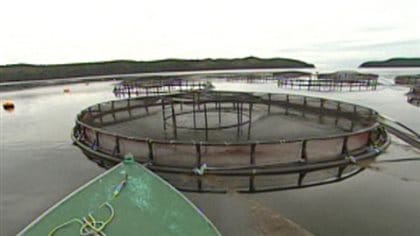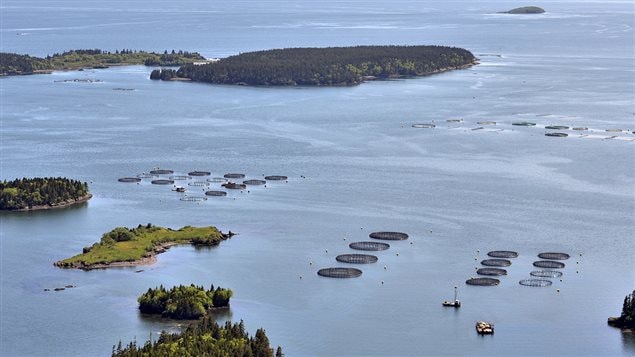Dozens of people representing business leaders, commercial and recreational fishing associations, scientists, lawyers and environmentalists are calling on Prime Minister Harper to halt the implementation of the proposed Aquaculture Activities Regulations.
The concern is pesticide chemical use by so-called fish farming operations.
Bill Ernst was among those at a news conference today. He is a retired biologist formerly with the government agency Environment Canada, who conducted research in the effects and dispersion of chemicals from the aquaculture industry.
Listen
Along with the Ecology Action Centre, the group of some 120 signatories has written an open letter to the Prime Minister urging reconsideration of planned changes regarding oversight of fish farms.
The groups are concerned about changes to the Fisheries Act, specifically sections which “prohibit the release of deleterious substances into water frequented by fish”.
Previously this was overseen by the agency Environment Canada, changes first proposed by the federal government in 2011, would see regulation of aquaculture chemicals go to a different agency, Health Canada.
Mr Ernst says that Health Canada hasn’t the resources or experience to enforce environmental regulations.
He says the new rules will also exempt fish farms from rules in their use of certain chemicals released into the water to control sea-lice pests.
He says in some cases these are the same chemicals farmers use but which are strictly controlled to prevent them from entering water-courses.
A newly released scientific study by the Department of Fisheries and Oceans on the impacts of two pesticides used to treat sea lice, Salmonsan and Alphamax, shows that there are lethal effects on lobster and the risk from one of those, Alphamax, exists up to ten kilometres from sites of use and concludes that there is a general lack of data on pesticide impacts on a wide variety of other marine species.
Susanna Fuller (PhD), Marine Conservation Coordinator at the Ecology Action Centre was also at the press conference in Halifax today. She says, “We already know that our oceans and coastal ecosystems are suffering from far too much pollution. With these proposed regulatory changes, we are actively allowing further pollution of our coastal waters. Our coastal industries, particularly those that rely on a healthy marine environment will be put at risk.”

Ernst says some of the toxic chemicals used by fish farms can spread and still affect marine life for several kilometers from the site. Crustaceans like lobster and their larvae can be especially affected.
The group hopes that with such a wide spectrum of research scientists, professors, other experts and concerned individuals, that the government may reconsider its plans to change regulations and policies.







For reasons beyond our control, and for an undetermined period of time, our comment section is now closed. However, our social networks remain open to your contributions.